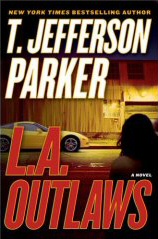
 Considering
Joaquin Murrieta Considering
Joaquin Murrieta
California schoolchildren grow up with stories of Joaquin Murrieta -- the famous
bandit who terrorized the state until he was shot and beheaded in 1853.
There's a famous drawing of Joaquin in which his eyes are big and his long black
hair is writhing like a head full of snakes and the menace in him is palpable.
Having traveled up and down the state since my childhood, I've noted dozens of
places claiming that "Joaquin Murrieta slept here," or "Joaquin Murrieta robbed
this establishment," or "Joaquin Murrieta used this location as a secret
hideaway," and the like.
There's a famous poster, which is still reproduced and often seen in California
roadhouses and biker bars and museums, with the unforgettable headline at the
top:
THE HEAD
of the renowned bandit
JOAQUIN!
To Be Exhibited at the Stockton House
August 19, 1853 -- Admission $1
And of
course, below the headline there's a crude illustration of a man's head
preserved in a jar of alcohol.
I
can tell you, that as a schoolboy, this poster got my undivided attention. My
schoolboy texts called Murrieta a murderer and a horse thief. They suggested
that he was a charmer and seducer of women. They all implied -- or stated --
that Murrieta was a homicidal madman and deserved to have his severed head
exhibited.
The trouble is, when you start looking for facts about this man's life, they're
hard to come by. It's like trying to catch smoke in your hand.
My
impressive New Encyclopedia of the American West, published by Yale
University, offers this opening line in its article on Joaquin:
"The existence of Joaquin Murieta, at least as the person to whom many murders
and thefts were attributed in Gold Rush California, remains questionable to many
historians."
Well, thanks. They don't even spell his name right. This encyclopedia goes on
to say that if the Joaquin Murrieta of folklore really did exist, he was born in
either Mexico or Chile, died in either 1853 or 1878. They say he was probably
one of FIVE Joaquins named by the California State Legislature to be hunted down
by legendary Texas Ranger Harry Love for their alleged felonies against the
people of California.
But author Walter Noble Burns wrote a biography about Joaquin, The Robin Hood
of El Dorado, in which young Joaquin was portrayed as a much-maligned
Mexican who bore the brunt of Anglo fear and racism.
Other writers posited that Joaquin was a good and honest man who was turned into
an avenging devil after his beautiful young wife was raped as he watched, and
his brother was hung for stealing a horse that he actually didn't steal, and
Joaquin himself was brutally horsewhipped.
Some
claim he was never beheaded, and the head in the jar belonged to another
Joaquin, or perhaps to a man not named Joaquin at all.
Some claim his head was taken by thieves, or lost in the San Francisco
earthquake.
In
short, the more you try to find out about Joaquin the less you know for sure.
Sad? Not really.
For thus is fired the imagination.
And I asked myself...what if Joaquin had a descendent who was alive today?
And what if Joaquin's head was not lost in an earthquake but rather stolen by
his grandchildren and smuggled down through generations of Murrietas, to end up
in a barn belonging to this descendent?
What if his diary was in the barn, too?
And his guns?
And what if his outlaw spirit still burned in the heart of this modern-day
descendent?
And what if this great-great-great-great-great-great grandchild decided to stoke
the legend of Murrieta again, to continue where Joaquin had left off -- to
become an outlaw, just like him?
What if she were a beautiful young schoolteacher?
What if the opening words of L.A. Outlaws were:
"Here's the deal. I'm a direct descendent of the outlaw Joaquin Murrieta."
Would you believe her, or not?
T. Jefferson
Parker

|





